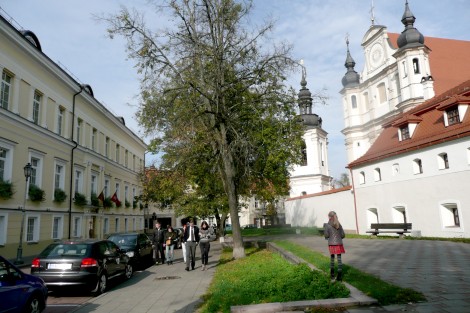- October 17, 2014
- 279
Roaming around the streets of Vilnius: Andrzej Wolan, a humanist from Bathory’s time

Andrzej Wolan was born around 1530 in the western part of Greater Poland. He happened to come to Vilnius. At present, one of the most charming and interesting historically streets of Vilnius is named after him (A. Volano g-vė). Its name changed in the course of history. It was known under the name of Pokrowska , St. Michalska III , Wolan’s, Education (Švietimo) street.
It is one of the shortest (70 metres long) streets of the old town. It is tightly built but only one building accounts for the sprawl, namely the Ministry of Education and Science of the Republic of Lithuania building. Other buildings have different address. In the place of the present-day plaza there was a Calvinist congregation. Several arrows in the direction of the St. Michael’s Church were released from there in 1639.
One of the arrows stucked in a painting on the facade of the church. According to Juliusz Kłos (Polish historian): “There was a tumult, the students of the academy started to attack the Calvinists in the defense of the nuns and the Parliament Guard had to step in. The problem was solved by the parliament and Wladyslaw IV, the king of Poland who ordered the Calvinists to move out of the city and to demolish the building previously belonging to the congregation”.
Civil dignitaries decided to move the congregation building outside of the city to Zawalna street (Pylimo). The present-day building was constructed according to a design of Karola Podczaszyńskiego between 1830-1835.
The Calvinists from Vilnius prayed in the church till 1945 when after Vilnius was incorporated into the Soviet Union it was changed into “Kronika” cinema. After 1991 the church was given back to the local Reform parish.
Also the history of the building which is the current residence of Ministry of Education and Science of the Republic of Lithuania is quite interesting. In XVI century there was Hornostaj’s palace which later belonged to Radziwiłł the Red who gave it to evangelicals. The building was partially destroyed by Catholics who blamed evangelicals for the attack on the St. Michael’s Church.
The church was re-edified many times under the direction of famous Vilnian architects including Michał Szulc and Juliusz Kłos. In XIX the palace belonged to Department of Chemistry of the Vilnius University. The big, round lecture hall was built especially for the needs of the famous chemist, Jędrzej Śniadecki. Another well-known person, Franciszek Smuglewicz, a famous painter, lived and worked on the first floor. He also died there.
Andrzej Wolan, who came to be known as “the Pope of Lithuanian Calvinists”, studied in Frankfurt and in Kaliningrad. He was a secretary to Mikołaj Radziwiłł the Red and the following kings: Sigismund Augustus, Stephen Bathory, Sigismund III Vasa.
According to an encyclopedic guide “Literatura Polska” he was: “used to deal with some important diplomatic issues. He was an eminent polemicist. He fought with the Roman Catholic Church and with antitrinitarians. He propagated Reformers’ beliefs (he argued with Piotr Skarga who tried to convert him to Catholicism). Wolan was the author of many political writings, in which he defended civil liberties. He was also a good orator. He wrote in Latin using a kind of sophisticated style”.
Tomas Venclova described Andrzeja Wolana in the following way: “He was a humanist from Bathory’s time who wrote around thirty books propagating reformation and equality…” I his most famous work entitled “De libertate politica sive civili” (“About the freedom of the republic and the nobles”) Wolan insists on more rights for small farmers and townsmen. He compared the nobles to a gold ring, townsmen to a jewel in the ring. Andrzej Wolan died in 1610 in Bijuciszkach near to Oszmiana (Belarus).
Translated by Gabriela Godek within the framework of a traineeship programme of the European Foundation of Human Rights, www.efhr.eu.

